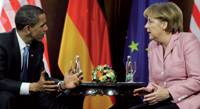 |
|
History of German-American Relations > |
|
The United States and Germany have built a solid foundation of bilateral cooperation in a relationship that has changed significantly over five decades. The historic unification of Germany and the role the United States played in that process have served to strengthen ties between the two countries. U.S. policy toward Germany remains the preservation and consolidation of a close and vital relationship with Germany, not only as friends and trading partners, but also as allies sharing common institutions. During the 45 years in which Germany was divided, the U.S. role in Berlin and the large American military presence in West Germany served as symbols of the U.S. commitment to the preservation of peace and security in Europe. Since German unification, the U.S. commitment to these goals has not changed. Nearly 59,000 U.S. military personnel remain in Germany to protect these common interests. As allies in NATO, the United States and Germany work side by side to maintain peace and freedom.
Following the September 11, 2001 attacks on the World Trade Center in New York City and the Pentagon in Washington, D.C., the United States and Germany have cooperated closely to combat international terrorism, for example in the areas of judicial cooperation, intelligence sharing and freezing the financial assets of suspected terrorists. This cooperation has shown tangible results and will continue. Source: Background Note on Germany. June 2009. U.S. Department of State See also: |
||||
Texts are abridged from U.S. State Department IIP publications and other U.S. government materials. |
||||
What kind of information materials are available?
CD: These documents are available in fulltext format on the About the USA CD-ROM. Teachers: Request a copy for classroom use. L: Selected documents are available in German as well as other languages, including Arabic, Chinese, French, Spanish, Persian and Turkish. |
DISCLAIMER Any reference obtained from this server to a specific commercial product, process, or service does not constitute or imply an endorsement by the United States Government of the product, process, or service, or its producer or provider. The views and opinions expressed in any referenced document do not necessarily state or reflect those of the United States Government. |
|


